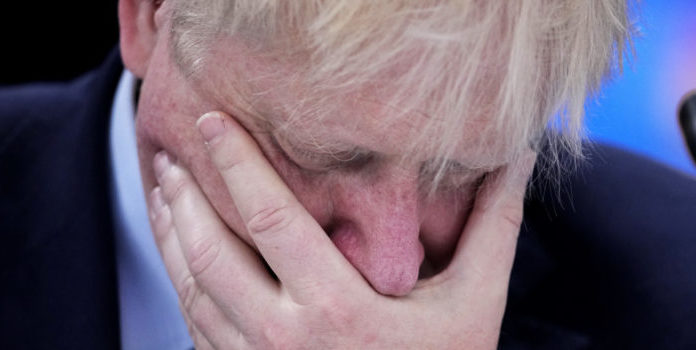(Headline USA) Boris Johnson has caved in to a Conservative Party revolt after months of ethics scandals and resigned as party leader, but he remains Britain’s prime minister—for now—while a successor is chosen.
Once hailed as a cross-the-pond ally of then-President Donald Trump, Johnson had pivoted toward a much more left-wing, globalist agenda in recent years, much to the chagrin of his fellow Tories.
After notably snubbing Trump on several occasions, he became an outspoken advocate for severe lockdowns during the coronavirus pandemic, favored radical environmentalist objectives, was an overzealous supporter of the globalist shadow-war in Ukraine and even attacked the US Supreme Court for its reversal of the federal abortion mandate established under Roe v. Wade.
Johnson’s resignation on Thursday comes after he weathered numerous scandals during a tumultuous three years in power in which he brazenly bent and sometimes broke the rules of British politics.
He survived a no-confidence vote last month. But recent revelations that Johnson knew about sexual misconduct allegations against a lawmaker before he promoted the man to a senior position in his government led to Johnson’s ouster.
His resignation, which came after dozens of ministers quit his government in protest, sparks a party contest to replace him as leader. All Conservative lawmakers are eligible to run, and party officials could open the nominations within hours.
After candidates have come forward, Conservative lawmakers vote in a series of elimination rounds. The candidate with the lowest number of votes drops out, and voting continues until there are two contenders left. Depending on the number of candidates, the process could be completed within days.
The final two candidates will be put to a vote of the full party membership across the country—about 180,000 people—by postal ballot. That process is expected to take several weeks, with the exact timetable up to the 1922 Committee that runs party elections.
The winner of the vote will become both Conservative leader and prime minister, without the need for a national election.
Already the list of likely contenders is long and growing, from recently resigned Treasury chief Rishi Sunak, his successor in that job Nadhim Zahawi, Foreign Secretary Liz Truss, Attorney General Suella Braverman and Defense Secretary Ben Wallace.
Under normal circumstances, Johnson would remain as prime minister until his successor is elected—a fitting bookend to his tenure in the top parliamernary spot. His predecessor, Theresa May, remained in office for more than a month between announcing her resignation and the selection of Johnson as the new Tory leader.
But many Conservatives say Johnson can’t stay in office—he has simply lost too many ministers through resignations to be able to govern. They are demanding he step down as prime minister and let an interim leader take the reins. If he does that, Deputy Prime Minister Dominic Raab is a likely caretaker candidate.
Still, Johnson shows no signs of going early.
He appointed several new Cabinet ministers on Thursday to replace those he has lost, and said they would “serve as I will until a new leader is in place.”
If party officials press Johnson to quit sooner and he refuses, the chaos engulfing the government could worsen in the short term. Already the government has had to cancel business in Parliament because it has no ministers available to attend.
Gavin Barwell, who served as chief of staff to Prime Minister Theresa May, said “there was a question whether the PM will be able to lead a caretaker government in the meantime—will enough ministers agree to serve?”
Former Conservative Prime Minister John Major said letting Johnson stay in office for up to three months “is unwise, and may be unsustainable.”
Under Britain’s political rules, the next election must be called by December 2024, five years after the last one.
But it could come sooner. Prime ministers with a majority in parliament can call snap elections at will, and Johnson’s successor may want to seek a personal mandate by going to voters not long after being selected.
However, with the backdrop of war in Ukraine and a worsening cost-of-living crisis, they may choose to wait.
Whoever takes over from Johnson will try to rebuild the Conservative Party’s popularity. Johnson led the party to a big parliamentary majority in December 2019, but months of scandal have tarnished both him and the party.
Polls suggest that if an election were held now the Conservatives would lose and the opposition Labour Party would form the new government.
Adapted from reporting by the Associated Press

